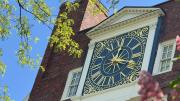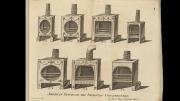In this spot stood Gore Hall...Built in the year 1838...Named in honor of Christopher Gore...Fellow of the College...Overseer...Benefactor...Governor of the Commonwealth...Senator of the United States." So runs the tablet on the west side of Widener Library. The brief memorial scants the impact in their own time of the building and the man. Gore Hall--Harvard's first library building--built of Quincy granite in a Gothic style, dominated the Yard and served the College nearly three-quarters of a century. (When Harvard president Edward Everett was asked in 1846 to design a seal for the newly incorporated City of Cambridge, he included Gore Hall to represent the College whose presence enhanced the city's reputation.) Christopher Gore, A.B. 1776, LL.D. 1809, left Harvard a then-record bequest of $100,000 "for the promotion of virtue, science, and literature" that covered more than a third of the building's cost. A legislator and diplomat, Gore was also a highly successful lawyer and venture capitalist. An archconservative in politics, he was a free thinker in religious and social matters. And throughout his life he honored two necessary components of the new nation: agriculture and books.
The son of a prosperous merchant, Gore entered Harvard in 1772 at the advanced age of 14. Among his student friends were the painter John Trumbull; James Freeman, the future minister of Boston's King's Chapel; and the future statesman Rufus King. As undergraduates, Gore and King revived a "speaking club" (one of the forerunners of the Hasty Pudding Club) and the friends' 50-year correspondence gives a wide-ranging view of their personal and political lives in Boston and beyond.
In later life, Gore continued to follow undergraduate affairs closely. Childless himself, he frequently invited students to his elaborate country seat in Waltham to dine, to read in his library (possibly the finest in New England), and to play billiards. But when students staged a walk-out because of poor food in 1805, Gore sided with the authorities, and when Rufus King's youngest son, a bon vivant, enrolled at the College, Gore urged his friend to advise the young man "to seek for happiness in library Fame, instead of shining as a Leader of festive parties."
Not that Gore shunned festivities. He and his wife, Rebecca (Payne), daughter of a director of the Bank of Massachusetts, lived rather more grandly than most New Englanders approved--which may have led to his defeat for a second term as governor in 1810. He sought the finest horses to ride and to draw his carriages, and traveled with outriders and postilions. The Gores' mansion was the scene of brilliant gatherings and their butler, Robert Roberts, an African American, offered his expertise to the wider community in 1827 when he published, with Gore's support, The House Servant's Directory.
In his political and civic connections, Gore moved in lofty circles. A delegate to the 1789 Massachusetts convention to ratify the Constitution, he was appointed by Washington the first U.S. attorney for Massachusetts and later named a member of the Jay Commission to England, charged with handling the tense issue of shipping disputes. Returning to the United States, he was elected to the Massachusetts legislature as a representative and then as a senator; higher offices followed. Meanwhile his law practice prospered. One of the young men whom he trained and mentored was Daniel Webster, who became an eloquent exponent of Gore's own Federalist views, which emphasized a strong central government active in encouraging trade and industries.
Even as Gore opposed the agrarian-focused goals of the rival Jeffersonian party, however, he shared with its leader a keen interest in progressive agriculture. He brought seeds and plants home from England and helped found the Massachusetts Society for Promoting Agriculture; his letters to Rufus King are full of references to his crops and farm. He kept a stall in Faneuil Hall to market his own produce, of which he was extremely proud; it was reputed among the earliest and best that the region could offer. So devoted was he to his farm that in later life, when he could no longer supervise from horseback, he had himself carried about on a litter.
Like Jefferson also, Gore surrounded himself with books, and he made them accessible to others. In 1804 he helped found a law library in Boston where still scarce legal works were available to all lawyers, judges, and legislators in the state. His personal library of works of Greek, Latin, history, and literature, numbering in the thousands, was a lifelong source of delight: shortly before his death, racked with painful arthritis, he wrote his friend King, "I do not repine, for I have yet a Satisfaction from Books."
It might be said that throughout an active public life intertwined with the formation and development of the new republic, and in retirement, Gore refreshed his mind and spirits with his library of classics while his feet were planted solidly on the acreage of "my farm at Waltham." Who could ask for more?
Thaxter P. Spencer '43 is president of Gore Place in Waltham, Massachusetts. The restored Gore mansion is now a museum and National Historic Landmark.
Opposite: Exterior and interior views of Gore Hall, and a detail from the Gore Place copy of one of John Trumbull's portraits of Gore. The Harvard original, then hanging in Winthrop House, was slashed across the face in the spring of 1969.





